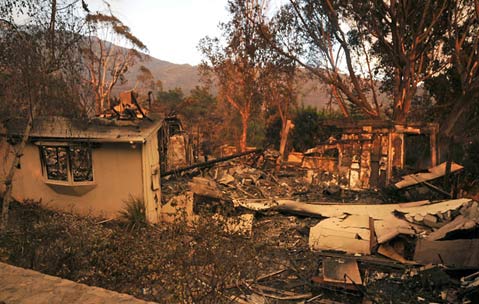Legal Protection in a Fire-Prone Landscape
Hiring a Lawyer Can Keep You from Getting Burned

Residents of Santa Barbara enjoy certain amenities that other parts of the country do not: On average, its residents enjoy around 300 sunny days per year. But what happens when the warm weather starts ramping up, and the already dry or even drought-like conditions are exacerbated by the gale-force winds known as Santa Anas?
Living on the Edge: April 29 marked the beginning of High Fire Season in Santa Barbara this year. Hot, dry, and often windy conditions can turn a spark into a thousand-acre blaze in a matter of minutes, threatening homes. In November 2008, Santa Barbara suffered the Tea Fire, which destroyed 210 homes, in November 2008, and the following May the Jesusita Fire destroyed 160 homes. (This year, in May, the White Fire burned almost 2,000 backcountry acres before it was contained. Last week, firefighters quickly stopped a half-acre blaze that ended up scorching only half an acre of brush along Highway 154.)
Property damage inevitably leads to insurance claims, which can subject homeowners who have already suffered losses to even more headaches and hassles. So what can Santa Barbara homeowners do to prepare for the insurance claims that follow in the aftermath of wildfires?
Insurance: One of the best lines of defense a property owner can have is an insurance policy specifically for fire losses, and many homeowners living in notorious burn areas are required to purchase them. Coverage should include your house and appurtenant structures, as well as your personal belongings. Policies should be kept up to date and include provisions for code upgrades. If you own art or other high-value items, consider getting a rider on your policy so those items will be specifically covered in the event of a loss. Insureds seldom have enough coverage for personal contents; keep this in mind when you are purchasing a policy.
Take Inventory: Ideally, you should inventory and catalogue every item in your home, from the most mundane to the most expensive, but most homeowners never take the time to do this until they are asked to do so by an insurance company – following a loss. An easy way to handle this is by photographing your belongings room by room, paying special attention to collectibles, one-of-a-kind pieces, jewelry, and other items that would be hard or impossible to replace or authenticate. A picture is worth a thousand words, particularly when it comes to proving you own and are entitled to the replacement value of something expensive.
Back Up Documents: Back up important documents electronically, including medical and prescription information, and a copy of your homeowners’ insurance policy. Whether you have the full policy stored in the “cloud,” or simply keep a photograph of your declarations page with endorsements stored on your smart phone, having first-hand access to your insurance documents in the event of a fire loss is invaluable. Insurance companies have been known to deny coverage by claiming they cannot locate a copy of your policy, causing unnecessary delays in obtaining immediate coverage for alternate living expenses. Alternatively, consider keeping a hard copy of your policy at your office outside the home, in a lock box at your bank, or in a fire-proof box that can be quickly accessed in the event of an emergency.
Hiring a Lawyer May Keep You From Getting Burned: Fighting insurance companies is neither easy nor enjoyable, and insurance companies rarely do the right thing voluntarily, even if you have faithfully implemented the foregoing suggestions. During litigation stemming from the Malibu Canyon Fire of 2007, a mediator in the case said to a homeowner whose house had burned to the ground, “You actually trusted the insurance company?” No matter how well documented your losses are, how much coverage you have, or how faithfully you make your premium payments, insurance companies are notorious for protecting their own interests first. Sadly, this is all too common. Lawyers can help navigate insurance policies and confusing coverage language, will represent you when the insurance company takes your Statement Under Oath (and will use every trick possible to twist your words and deny your claim), and can help prove liability and the value of your damages. A lawyer is someone who will be on your side in the event of a loss and can better your chances of surviving a fire-loss, and subsequent insurance claim, without getting burned.



